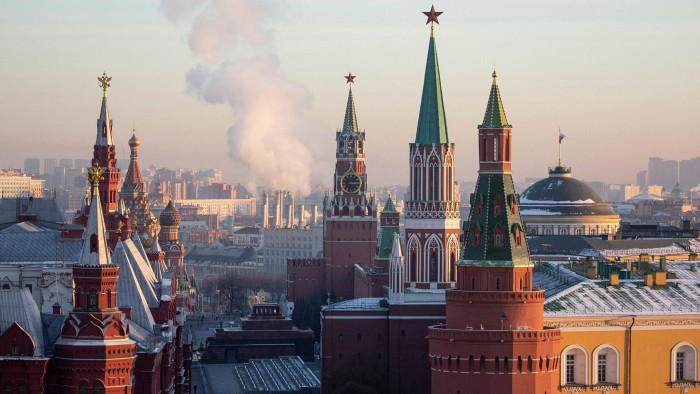Why Russia might appeal for dividend hunters

Simply sign up to the Russian business & finance myFT Digest -- delivered directly to your inbox.
Every news consumer in the western world can now be an expert on the Ukrainian front. The daily Russian order of battle, unit names, logistical issues, whether the ground is frozen deeply enough for heavy armour — it is all there online for the amateur analyst. We even know Russian strategic and tactical intentions thanks to psychologists and Washington think-tank experts.
But what if there is no war? For investors with a high-risk appetite that are willing to overlook geopolitical tensions and concerns over the way Moscow governs, the research might be better deployed on deep-value Russian equities.
One outcome of the Kremlin’s economic and social control over its big companies is high dividend payouts. Since 2016, it has been Russian state policy to force key companies to pay out at least half of their profits in dividends.
This has proved helpful in raising the cash to meet pension and military-industrial development costs. For investors, that means there are quite a few deep-value Russian equities with high dividend yield. According to Renaissance Capital, the consensus forecast for the dividend yield on MSCI Russia Index companies over the next 12 months is currently at 11 per cent. That is the largest such estimated yield among all countries in the MSCI Emerging Markets Index.
This may be counterintuitive to those who formed their understanding of Russian asset management based on the 1990s model of crime bosses turned goon-enabled oligarchs. Or on the longer history of Russian corporate misgovernance. Note the old Russian proverbs: “Blat (corruption) is stronger than Stalin” or “In the west they make money from profits. In Russia we make money from costs.”
President Vladimir Putin knows more of those jokes than you do. From the Kremlin’s perspective, every dollar a corporate insider siphons from company cash flow into property on the Côte d’Azur is a dollar lost. And, while Moscow does not care what some non-government organisation thinks about western-style press freedom, it is interested in imposing international accounting standards on public companies. Especially legacy resource companies with partial state ownership.
This may seem contrary to the usual classical liberal reasoning, which is that state-owned enterprises will be less investor-responsive than sweat-of-the-brow private sector entities, but go back to that proverb about Russians making money from costs. Cash paid in dividends is cash that has not been diverted by crooked managers.
And, according to one study co-authored by an interior ministry (MVD) academician, “in Russia, when information asymmetry is higher, the dividend payments will be lower”. In this context, “information asymmetry” means that company insiders do not pass the truth to either the public or the state. That makes for bad decisions at the centre.
It would be better if there were a free press to analyse that information, and there is not. Enterprising financial publications such as VTimes have been shut down.
There are, though, oversight “organs” such as the MVD and the Accounts Chamber. And local institutional and retail investors are growing in influence. International investors have in effect transferred oversight “technology” to Russia, which helps reinforce the internal transparency the Kremlin has sought since tsarist times.
The high dividend-increased corporate transparency regime was first codified by the finance ministry under former prime minister Dmitry Medvedev, who arguably was not the most convincing leader for anti-corruption campaigns. The current prime minister, Mikhail Mishustin, made his bones by his digital transformation of the Russian tax service.
While Mishustin makes all the expected noises about “sovereignty” and “Made in Russia”, he supports the finance ministry’s corporate governance push, and has concentrated on reducing the stultifying complexity and opacity of the central administration.
His efforts can, and have, been described as “Foolproofing Putinism”. And they have been accompanied by political repression and an aggressive foreign policy.
The corporate governance efforts, however, have the effect of serving not only “Putinism”, but the interests of foreign portfolio investors in Russia’s resource extraction industries such as oil, gas and fertilisers, as well as the country’s capable metallurgical sector.
There are, of course, still big risks with investing in Russian companies. The companies that put on what might be described as the acceptable face of Russian capitalism tend to be the ones that interact most with the outside world. Others are more opaque.
There are also major problems with the Russian state’s high-handed approach to the law, and its mistreatment of companies that offend it for some reason. You never quite know what lies round the corner. The Mishustin administration is also lagging behind in introducing 5G wireless, which is essential to Russia’s diversification beyond resource exploitation and its attractiveness as an investment centre.
Even so, investors targeting dividend yield in some of the biggest Russian companies will find their interests may be aligned with those of Putin and his finance ministry.
Comments